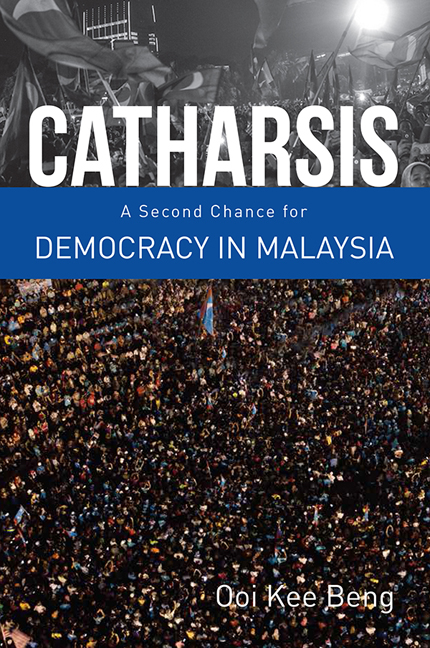Book contents
- Frontmatter
- Contents
- Foreword
- 1 Introduction – Malaysia's Future Is Redeemed
- Before Pakatan Harapan
- Before 9 May 2018
- 12 Racialising the Un-racialisable: What Is the Red Shirt Rally All About?
- 13 One Country's Merdeka Is Another's Damage Control
- 14 Malaysia – Where Politics Must Be Ethnically Inclusive and Exclusive at the Same Time
- 15 Is Malaysia at a Crossroads or in a Quagmire?
- 16 Unity Without Solidarity Sows Disunity
- 17 UMNO and Looking Back at History
- 18 Sarawak Forces Federal Opposition to Do Deep Soul-searching. But Can It?
- 19 By-elections Reveal New Malay Politics
- 20 Interview with Mahathir Mohamad: ‘People Must Be Able to Hold Their Heads Up.’
- 21 Malaysia Has to Start Re-examining Its Histories
- 22 Waves from US Probe into 1MDB May Turn into Tsunami
- 23 Seeking a New Formula to Unite Malaysia's Diversity
- 24 Time for Anwar to Accept Mahathir's Olive Branch?
- 25 Najib, Mahathir and the Timing of Malaysia's Polls
- 26 Excessive Governance Is Not Good Governance
- 27 Why Malaysia's Opposition Will Take to the Streets Again
- 28 Merdeka is About The Individual, Too
- 29 A Battle Between Malay Leaders Over Malaysia's Future
- 30 The Primacy of Political Economy in Asia
- With Mahathir at the Helm
- Beyond 9 May 2018
- About the Author
15 - Is Malaysia at a Crossroads or in a Quagmire?
from Before 9 May 2018
Published online by Cambridge University Press: 12 February 2019
- Frontmatter
- Contents
- Foreword
- 1 Introduction – Malaysia's Future Is Redeemed
- Before Pakatan Harapan
- Before 9 May 2018
- 12 Racialising the Un-racialisable: What Is the Red Shirt Rally All About?
- 13 One Country's Merdeka Is Another's Damage Control
- 14 Malaysia – Where Politics Must Be Ethnically Inclusive and Exclusive at the Same Time
- 15 Is Malaysia at a Crossroads or in a Quagmire?
- 16 Unity Without Solidarity Sows Disunity
- 17 UMNO and Looking Back at History
- 18 Sarawak Forces Federal Opposition to Do Deep Soul-searching. But Can It?
- 19 By-elections Reveal New Malay Politics
- 20 Interview with Mahathir Mohamad: ‘People Must Be Able to Hold Their Heads Up.’
- 21 Malaysia Has to Start Re-examining Its Histories
- 22 Waves from US Probe into 1MDB May Turn into Tsunami
- 23 Seeking a New Formula to Unite Malaysia's Diversity
- 24 Time for Anwar to Accept Mahathir's Olive Branch?
- 25 Najib, Mahathir and the Timing of Malaysia's Polls
- 26 Excessive Governance Is Not Good Governance
- 27 Why Malaysia's Opposition Will Take to the Streets Again
- 28 Merdeka is About The Individual, Too
- 29 A Battle Between Malay Leaders Over Malaysia's Future
- 30 The Primacy of Political Economy in Asia
- With Mahathir at the Helm
- Beyond 9 May 2018
- About the Author
Summary
Malaysia has drawn the attention of the global community in recent times and this has largely been much more as negative publicity than positive. Just last Thursday, the European Parliament passed a resolution deploring ‘the deteriorating human rights situation in Malaysia and in particular the crackdown on civil society activists, academics, media and political activists.’
This follows a series of reports throughout the year in the Wall Street Journal on scandals in high places in Malaysia. These are just two of many other cases.
While this sustained attention from abroad is new, the analysis tends to be too much focused on the contemporariness conditions than it should be. Malaysians in general understand the country's difficult situation to be a profound one, rooted in a unique history as much as in notional narrowness.
The country may have gained independence in a relatively easy manner, but over time, no one should have thought that the nationbuilding to come would be an easy one. Many things have changed but the question remains: Is Malaysia a country at a crossroads or in a quagmire?
That is as relevant a question today to ask about Malaysia as it ever has been. I am more prone than ever to ask it though after reading some books very recently about the social history and politics of the late colonial period in British Malaya.
Throughout the 1930s, Malay newspapers were being established to satisfy the growing need among Malay intellectuals to discuss the situation of their community. The world was in a deep economic crisis then and the growing notions of nationhood and ethnic essentialism led to a hostile debate between those professing the term ‘Malayans’ and those Malays who would not recognise that notion. The Malay newspapers were those driving the debate most consistently.
More than 80 years later, from the vantage point of 2015 going into 2016, it is stimulating to compare the two periods and to see what has changed and what has stubbornly remained the same.
This article cannot profess to give a list of these things; it can only prod readers to proceed on their own and study and contemplate the exciting history of late colonialism in order to better understand the Malaysian nation, as it stands today.
- Type
- Chapter
- Information
- CatharsisA Second Chance for Democracy in Malaysia, pp. 52 - 54Publisher: ISEAS–Yusof Ishak InstitutePrint publication year: 2018



